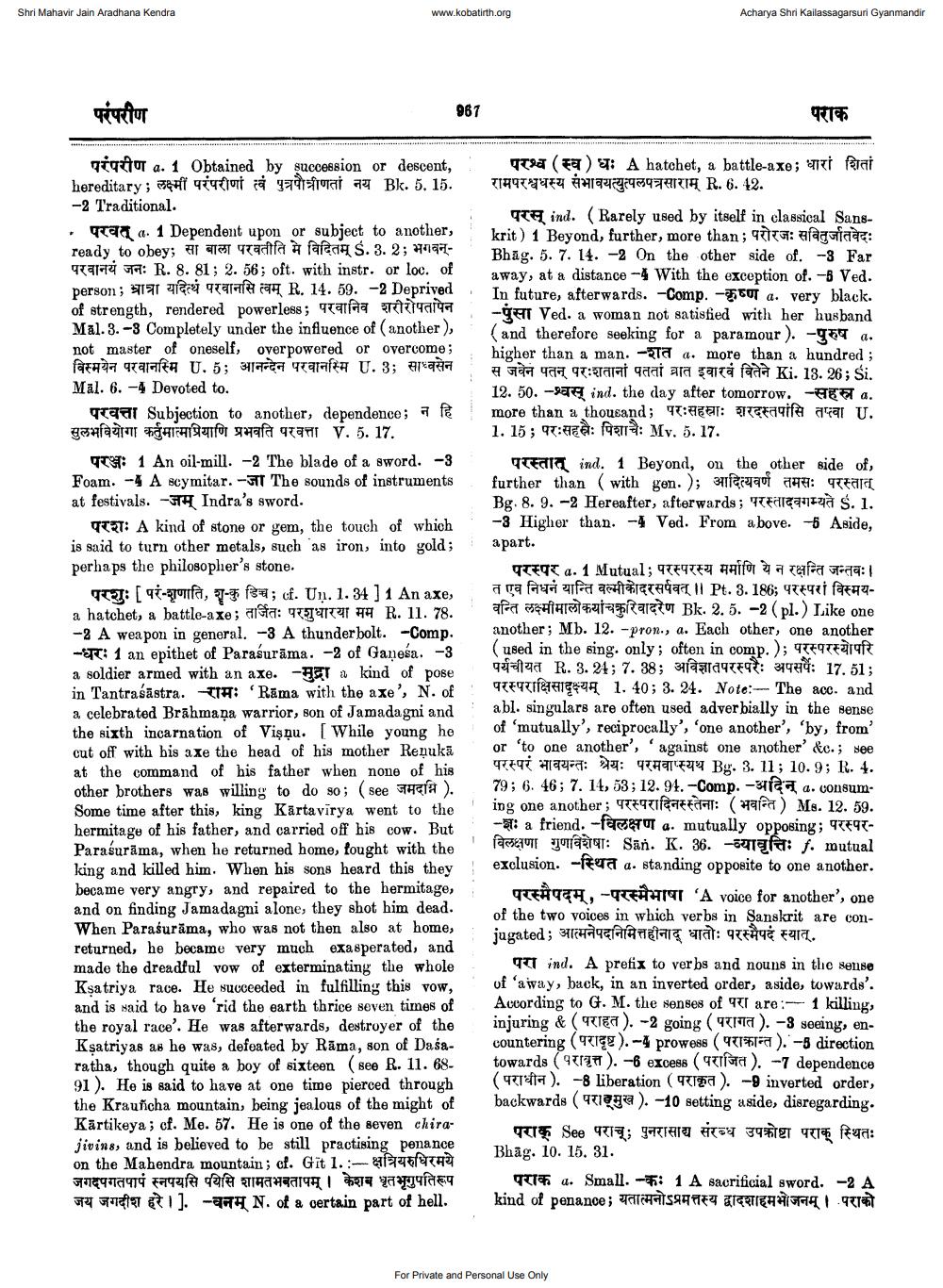________________
Shri Mahavir Jain Aradhana Kendra
www.kobatirth.org
Acharya Shri Kailassagarsuri Gyanmandir
परंपरीण
961
पराक
qator a. 1 Obtained by succession or descent, hereditary; लक्ष्मी परंपरीणां त्वं पुत्रपौत्रीणतां नय Bk.5.15. -2 Traditional.
pat a. 1 Dependent upon or subject to another, ready to obey; a atuada a farech . 3. 2; 19974 1 : R. 8. 81 ; 2. 56; oft. with instr. or loc. of person; 1991 e qartë 4 R. 14. 59. - 2 Deprived of strength, rendered powerless; qarfa staiga Mal. 3.-3 Completely under the influence of another, not master of oneself, overpowered or overcome; fac ea qaraf U. 5; 34aea qaraf U. 3; apan Māl. 6. - 4 Devoted to.
Taal Subjection to another, dependence; a gaulant FATHIA mala qani V. 5. 17.
* 1 An oil-mill. -2 The blade of a sword. -3 Foam. -4 A scymitar. -JIT The sounds of instruments at festivals. - Indra's sword.
TTT: A kind of stone or gem, the touch of which is said to turn other metals, such as iron, into gold; perhaps the philosopher's stone.
Ty: [ 91-zona, 7- ; cf. Un. 1. 34 ] 1 An axe, a hatchet, a battle-axe; aita: 97444 44 R. 11. 78. -2 A weapon in general. -3 A thunderbolt. -Comp.
er: 1 an epithet of Parasurāma. -2 of Gaņeśa. -3 a soldier armed with an axe. - ET a kind of pose in Tantraśāstra. #: Rama with the axe', N. of a celebrated Brāhmaṇa warrior, son of Jamadagni and the sixth incarnation of Vişņu. [ While young he cut off with his axe the head of his mother Renuka at the command of his father when none of his other brothers was willing to do so; (see Thera). Some time after this, king Kārtavīrya went to the hermitage of his father, and carried off his cow. But Parasurama, when he returned home, fought with the king and killed him. When his sons heard this they became very angry, and repaired to the hermitage, and on finding Jamadagni alone, they shot him dead. When Paraśurāma, who was not then also at home, returned, he became very much exasperated, and made the dreadful vow of exterminating the whole Ksatriya race. He succeeded in fulfilling this vow, and is said to have 'rid the earth thrice seven times of the royal race'. He was afterwards, destroyer of the Ksatriyas as he was, defeated by Rama, son of Daśaratha, though quite a boy of sixteen Bee R. 11. 6891 ). He is said to have at one time pierced through the Krauscha mountain, being jealous of the might of Kārtikeya; cf. Me. 57. He is one of the seven chirajivins, and is believed to be still practising penance on the Mahendra mountain; cf. Git 1.:जगदपगतपापं स्नपयसि पयसि शामतभवतापम् । केशव धृतभृगुपतिरूप 972 T ]. - N. of a certain part of hell.
Tea (a) : A hatchet, a battle-axe; i ferai 71899 Hay97974114 R. 6. 42.
TTE ind. Rarely used by itself in classical Sanskrit) 1 Beyond, further, more than ; 91:afagiaa: Bhag. 5. 7. 14. -2 On the other side of. -8 Far
away, at a distance - 4 With the exception of. -8 Ved. . In future, afterwards. -Comp. - COT a. very black.
- er Ved. a woman not satisfied with her husband
and therefore seeking for a paramour). -957 a. higher than a man. - a. more than a hundred ; a 4617 97:Tamat gaat ara cara faa Ki. 13. 26; Si. 12. 50.- 6ind. the day after tomorrow. -487a. more than a thousand; 77:EET: patagih aral U. 1. 15; 97:ee: 99: My. 5. 17.
T alt ind. 1 Beyond, on the other side of, further than with gen.); fuauf 28: qtare Bg. 8. 9. -2 Hereafter, afterwards ; H anzà . 1. -3 Higher than. -4 Ved. From above. 5 Aside, apart.
TECT a. 1 Mutual; 9789*4 rafoa rufaa: a safari za acuarelagat ll Pt. 3. 186; 42*421 9494afa H aierarctur Bk. 2.5. -2 (pl.) Like one another; Mb. 12. -pron., a. Each other, one another (used in the sing. only; often in comp.); 99 Farf
ale R. 3. 24; 7. 38; 3ala979: 3444: 17. 51; TETRIÇey 1. 40; 3. 24. Note: The acc. and : abl. singulars are often used adverbially in the sense
of 'mutually', reciprocally', 'one another', 'by, from' or 'to one another', 'against one another' &c.; see
97 94 : 3: 7734 By. 3. 11; 10.9; R. 4. 79; 6. 46; 7. 14, 53; 12. 94. -Comp. - a. consuming one another ; 48921featedat: (a ) Ms. 12. 59.
-शः a friend. -विलक्षण a. mutually opposing; परस्परf u JUICE: Sān. K. 36. Stęfe: f. mutual exclusion. P a a. standing opposite to one another.
TECH, THAT'A voice for another', one of the two voices in which verbs in Sanskrit are conjugated; 3449faathi aat: 9 43 791.
q1 ind. A prefix to verbs and nouns in the sense of 'away, back, in an inverted order, aside, towards'. According to G. M. the senses of ar are:- 1 killing, injuring & (RET). -2 going (14). - seeing, encountering (cree). -4 prowess (97191-27). -direction towards (911). -6 excess (IT). -7 dependence (ra). -8 liberation (978). -9 inverted order, backwards (wigga). -10 setting aside, disregarding.
पराक् See पराच्; पुनरासाद्य संरब्ध उपक्रोष्टा पराक् स्थितः Bhàg. 10. 15. 31.
1. 4. Small. -*: 1 A sacrificial sword. 2 A kind of penance; MATCH594072 arikh 1927
For Private and Personal Use Only




